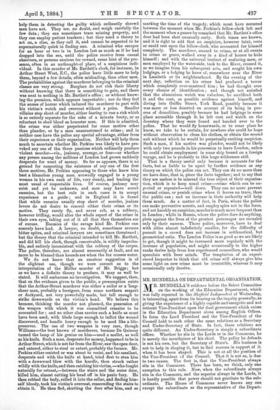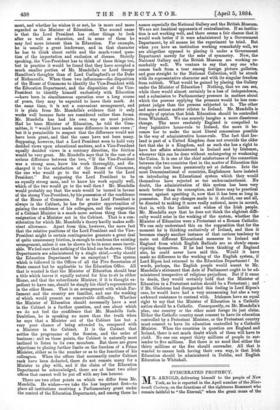MR. MUNDELLA ON DEPARTMENTAL ORGANISATION.
MR. MUNDELLA'S evidence before the Select Committee on the working of the Education Department, which was fully reported in the Sheffield Independent of Wednesday, is interesting, apart from its bearing on the inquiry generally, as giving the experience of a highly capable and energetic and not reticent Vice-President upon the dual government which exists in the Education Department alone among English Offices. In form the Lord President and the Vice-President of the Council hold to each other the same relations as a Secretary and Under-Secretary of State. In fact, these relations are quite different. An Under-Secretary is simply a subordinate officer. Whether he sits in the Lords or in the Commons, he is merely the mouthpiece of his chief. The policy he defends is not his own, but the Secretary of State's. His business is not to help in shaping it, but to find reasons in support of it when it has been shaped. This is not at all the position of the Vice-President cf the Council. That it is not so, is due to two causes. The first is, that the Vice-President always sits in the Commons. There has been, we think, only one exception to this rule. Now, when the subordinate always sits in the Commons, and the superior always in the Lords, it is hardly possible that power should not gravitate to the sub- ordinate. The House of Commons never knows any one except the subordinate as the representative of the Depart-. ment, and whether he wishes it or not, he is more and more regarded as the Minister of Education. The second cause is that the Lord President has other things to look after as well as education, and in some of them he may feel more interest than in Education. For example, he is usually a great landowner, and in that character he has to think about cattle and the much-vexed ques- tion of the importation and exclusion of disease. Strictly speaking, the Vice-President has to think of these things too, but in practice it would be found that they have occupied a much smaller portion of Mr. Mundella's or Lord George Hamilton's thoughts than of Lord Carlingford's or the Duke of Richmond's. When these two influences—the disposition of the House of Commons to identify the Vice-President with the Education Department, and the disposition of the Vice. President to identify himself exclusively with Education —have been in simultaneous operation over a long course of years, they may be expected to leave their mark. At the same time, it is not a convenient arrangement, and it is plain from Mr. Mundella's evidence that it only works well because facts are considered rather than forms. Mr. Mundella has had his own way on most points. Had he been Minister of Education, he told the Com- mittee, it "would have made some difference in some cases ;" but it is permissible to suspect that the difference would not have been great, and that the cases have not been many. Supposing, however, that a Lord President were to hold very decided views upon educational matters, and a Vice-President equally decided views in a contrary direction, the friction would be very great. Mr. Mundella says that in the case of a serious difference between the two, "If the Vice-President was a strong man, knew his work thoroughly, and dis- charged it to the satisfaction of the House of Commons, the one who would go to the wall would be the Lord President." But supposing the Lord President to be an equally strong man, and to know his work equally well, which of the two would go to the wall then ? Mr. Mundella would probably say that the scale would be turned in favour of the strong Vice-President, by his possession of the confidence of the House of Commons. But as the Lord President is always in the Cabinet, he has far greater opportunities of gaining the confidence of his colleagues, and the resignation of a Cabinet Minister is a much more serious thing than the resignation of a Minister not in the Cabinet. That is a con- sideration for which Mr. Mundella's theory hardly makes suffi- cient allowance. Apart from this, however, the mere fact that the relative positions of the Lord President and the Vice- President might in certain contingencies generate a great deal of quite unnecessary friction, is enough to condemn the existing arrangement, unless it can be shown to be in some sense inevit- able. We feel sure that nothing of the kind can be shown. Other Departments are administered by a single chief,—why should the Education Department be an exception ? The system which is followed in the Offices of all the Five Secretaries of State cannot but be applicable to the Education Office. All that is wanted is that the Minister of Education should bear a title which leaves it equally natural for him to sit in either House, and that the subordinate Minister, if it is thought ex- pedient to have one, should be simply his chief's representative in the other House. That is an arrangement with which Par- liament and the country are familiar, and one the working of which would present no conceivable difficulty. Whether the Minister of Education should necessarily have a seat in the Cabinet is a further question, and one about which we do not feel the confidence that Mr. Mundella feels. Doubtless, he is speaking no more than the truth when he says that a Minister out of the Cabinet has but a very poor chance of being attended to, compared with a Minister in the Cabinet. It is the Cabinet that settles the programme of the Session, and the order of business ; and on these points, the Cabinet is naturally most inclined to listen to its own members. But there are grave objections to placing further limits on the freedom of a Prime Minister, either as to the number or as to the functions of his colleagues. When the offices that necessarily confer Cabinet rank have been deducted, there do not remain many for a Minister to play with, and if the claim of the Education Department be acknowledged, there are at least two other offices that cannot well be put off with any less honour.
There are two other points on which we differ from Mr. Mundella. He wishes—we take the less important first—to place all institutions receiving a Parliamentary grant under the control of the Education Department, and among these he
names especially the National Gallery and the British Museum. We are not fanatical opponents of centralisation. If an institu- tion is not working well, and there seems a fair chance that it would work better if it were administered by a Government Department, by all means let the experiment be tried. But when you have an institution working remarkably well, we are altogether opposed to placing it under a Government Department merely for the sake of symmetry. Now, the National Gallery and the British Museum are working re- markably well. We venture to say that any one who comes back from a tour among foreign picture galleries, and goes straight to the National Collection, will be struck with its representative character and with its singular freedom from rubbish. What would be gained by placing the Gallery under the Minister of Education ? Nothing, that we can see, while there would almost certainly be a loss of independence, and a submission to Parliamentary pressure in matters about which the persons applying the pressure would be less com- petent judges than the persons subjected to it. The other and more serious matter relates to Ireland. Mr. Mundella is strongly of opinion that Irish Education should be controlled from Whitehall. We can scarcely imagine a more disastrous change. The more resolutely England is compelled to deny legislative home-rule to Ireland, the more it be- comes her to make the most liberal concessions possible in the way of administrative home-rule. The fact that Ire- land is part of a United Kingdom does not override the older fact that she is a Kingdom, and as such she has a right to have her affairs administered in Ireland and by Irishmen, wherever this can be done without endangering or weakening the Union. It is one of the chief misfortunes of the connection between the two countries that in the matter of Education this simple rule has been persistently set at defiance. Into the most Denominational of countries, Englishmen have insisted on introducing an Educational system which they would themselves have rejected as too undenominational. No doubt, the administration of this system has been very much better than its conception, and there may be practical reasons against upsetting it, now that it has been so long in possession. But any changes made in it should, one and all, be directed to making it more really national, more in accord, that is, with the habits and wishes of the Irish people. Mr. Mundella says that he does not think the slightest diffi- culty would arise in the working of the system, whether the Minister of Education were a Protestant or a Roman Catholic. We can only understand this on the supposition that for the moment he is thinking exclusively of Ireland, and then it becomes simply another instance of that curious tendency to mete out different Educational measures to Ireland and England from which English Radicals are so slowly eman- cipating themselves. If he had been thinking of England
also, he could never have said this. Would it have made no difference to the working of the English system, if Lord Ripon had returned to the Education Department ? In words, perhaps, the English people would assent to Mr. Mundella's statement that Acts of Parliament ought to be ad- ministered irrespective of religious prejudices. But if it came to deeds, they would certainly hold that the Minister of Education in a Protestant nation should be a Protestant ; and if Mr. Gladstone had disregarded this feeling in Lord Ripon's case, he would have had a very unreasoning but also a very awkward resistance to contend with. Irishmen have an equal right to say that the Minister of Education in a Catholic nation should be a Catholic. Consequently, on Mr. Mundella's plan, one country or the other must forego its just claim. Either the Catholic country must consent to have its education controlled by a Protestant Minister, or the Protestant country must consent to have its education controlled by a Catholic Minister. When the countries in question are England and Ireland, there is not much doubt which of them will have to yield. No one can expect thirty millions of people to sur- render to five millions. But there is no need that either the thirty millions or the five should surrender. All that is wanted to ensure both having their own way, is that Irish Education should be administered in Dublin, and English Education in Whitehall.















































 Previous page
Previous page